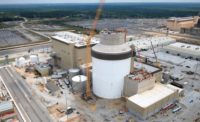The Shaw Group's recent initial rejection of more than 200 steel embedments supplied to Georgia Power's $14-billion Plant Vogtle nuclear power project, sited near Waynesboro, Ga., is the latest in a series of quality-control lapses by various project suppliers.
As the prime contractor for project quality assurance, Shaw reported in September to the Nuclear Regulatory Commission (NRC) that 211 of the more than 800 embedments delivered by Cives Steel Co., Thomasville, Ga., did not pass the contractor's initial pre-installation quality inspection. To be used in a building that will contain spent nuclear fuel, these steel plates, which measure roughly 18 in. by 18 in., act as a connection point for reinforcing steel and serve to transfer loads.
According to the report, the allegedly deficient embedments contain a variety of faults, including "unacceptable welds and weld repairs, missing Nelson studs, damaged Nelson studs, improper painting, incorrect dimensions and illegible markings."
Of the 211, 136 were reworked into compliance at the site, 50 were returned to Cives, and another 25 were to be examined further, Shaw stated. The contractor said it would report its full findings by Nov. 6.
Both Shaw and the NRC said this latest materials problem wouldn't affect the construction schedule.
This isn't the first time the project has received deficient materials. Earlier in 2012, Shaw identified steel reinforcing—produced by Joseph Oat Corp., Camden, N.J.—attached to 218 embedments exceeded the limit for yield strength. Again, the contractor identified the items before installation.
Joseph Oat rebutted Shaw's claims of noncompliance and argued that its product met all specifications. Tests showed the rebar's actual yield strength exceeded the specified yield strength by more than 18,000 psi.
Also earlier this year, Shaw rejected a small percentage of rebar provided by Gerdau Ameristeel, Tampa, Fla., for threading defects.
Jeffrey Merrifield, senior vice president with Shaw's power group in Charlotte, N.C., says the supplier issues underscore the challenge of building the first new nuclear reactor in the U.S. in more than 35 years. The difficulties suggest companies, unused to the work, lack a full understanding of NRC standards.
Merrifield says, "We're having to be very vigilant with our suppliers to make sure that the components they're supplying fully meet expectations and that they are in conformance with NRC requirements."
Merrifield, who previously served as an NRC commissioner, says some suppliers to the Vogtle project may need to improve their quality-assurance efforts.
"Our expectation would be that [these components] would've been put through a quality-assurance program that would've resulted in our getting items that are fully in compliance," Merrifield says. "There is a learning curve that we're dealing with right now."
The NRC says the identification of potentially non-compliant materials shows the project's inspection program is working.
"[Shaw] identified the problem and flagged it," says Joey Ledford, a NRC public-affairs officer based in Atlanta. "It didn't even get to the point that our inspectors had to find [the issues] on-site."
In August, Georgia Power Co. reported to the Georgia Public Service Commission that the estimated cost of the "original engineering, procurement and construction" of the project was $92 million less than projected at the time of the facility's certification. The utility estimated the total cost for project financing, the EPC contract and quality assurance at $6.2 billion, with the overall investment estimated at $14 billion. Vogtle's nuclear units are scheduled to be in service by November 2016 and November 2017, respectively.





Post a comment to this article
Report Abusive Comment